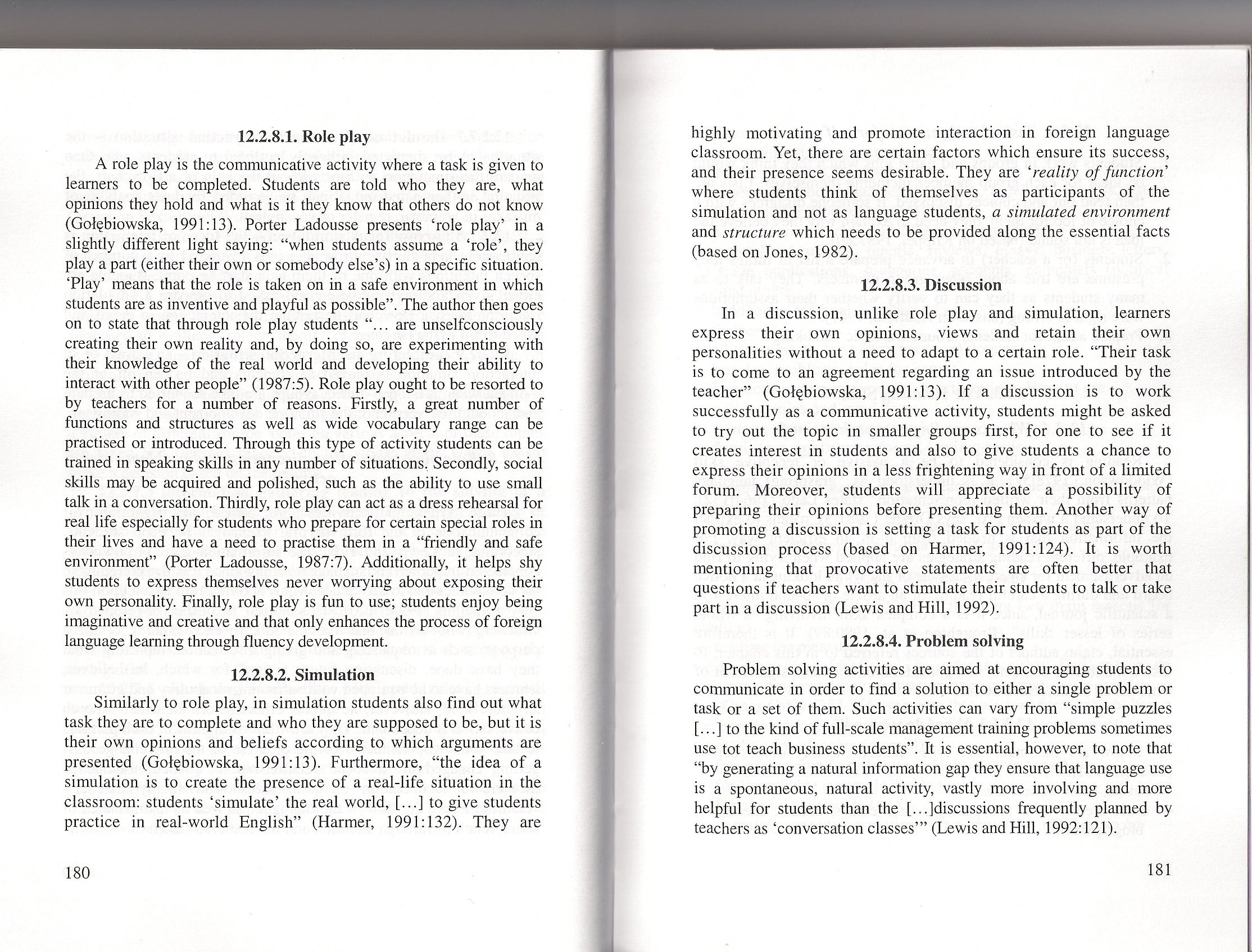50084 skanowanie0090 (2)

12.2.8.1. Role play
A role play is the communicative activity where a task is given to leamers to be completed. Students are told who they are, what opinions they hołd and what is it they know that others do not know (Gołębiowska, 1991:13). Porter Ladousse presents ‘role play’ in a slightly different light saying: “when students assume a ‘role’, they play a part (either their own or somebody else’s) in a specific situation. ‘Play’ means that the role is taken on in a safe environment in which students are as inventive and playful as possible”. The author then goes on to State that through role play students .. are unselfconsciously creating their own reality and, by doing so, are experimenting with their knowledge of the real world and developing their ability to interact with other people” (1987:5). Role play ought to be resorted to by teachers for a number of reasons. Firstly, a great number of functions and structures as well as wide vocabulary rangę can be practised or introduced. Through this type of activity students can be trained in speaking skills in any number of situations, Secondly, social skills may be acąuired and polished, such as the ability to use smali talk in a conversation. Thirdly, role play can act as a dress rehearsal for real life especially for students who prepare for certain special roles in their lives and have a need to practise them in a “ffiendly and safe environment” (Porter Ladousse, 1987:7). Additionally, it helps shy students to express themselves never worrying about exposing their own personality. Finally, role play is fun to use; students enjoy being imaginative and creative and that only enhances the process of foreign language leaming through fluency development.
12.2.8.2. Simulation
Similarly to role play, in simulation students also find out what task they are to complete and who they are supposed to be, but it is their own opinions and beliefs according to which arguments are presented (Gołębiowska, 1991:13). Furthermore, “the idea of a simulation is to create the presence of a real-life situation in the classroom: students ‘simulate’ the real world, [...] to give students practice in real-world English” (Harmer, 1991:132). They are highly motivating and promote interaction in foreign language classroom. Yet, there are certain factors which ensure its success, and their presence seems desirable. They are lreality of function where students think of themselves as participants of the simulation and not as language students, a simulated environment and structure which needs to be provided along the essential facts (based on Jones, 1982).
12.2.8.3. Discussion
In a discussion, unlike role play and simulation, learners express their own opinions, views and retain their own personalities without a need to adapt to a certain role. “Their task is to come to an agreement regarding an issue introduced by the teacher” (Gołębiowska, 1991:13). If a discussion is to work successfully as a communicative activity, students might be asked to try out the topie in smaller groups first, for one to see if it creates interest in students and also to give students a chance to express their opinions in a less frightening way in front of a limited forum. Moreover, students will appreciate a possibility of preparing their opinions before presenting them. Another way of promoting a discussion is setting a task for students as part of the discussion process (based on Harmer, 1991:124). It is worth mentioning that provocative statements are often better that ąuestions if teachers want to stimulate their students to talk or take part in a discussion (Lewis and Hill, 1992).
12.2.8.4. Problem solying
Problem solving activities are aimed at encouraging students to communicate in order to find a solution to either a single problem or task or a set of them. Such activities can vary from “simple puzzles [...] to the kind of full-scale management training problems sometimes use tot teach business students”. It is essential, however, to notę that “by generating a natural information gap they ensure that language use is a spontaneous, natural activity, vastly morę involving and morę helpful for students than the [...]discussions freąuently planned by teachers as ‘conversation classes’” (Lewis and Hill, 1992:121).
181
Wyszukiwarka
Podobne podstrony:
skanowanie0090 (2) 12.2.8.1. Role play A role play is the communicative activity where a task is giv
264 (11) Załącznik 2 cd. FUEL AND WATER CALCULATION PART II INTERMEDIATE SECTION IS REQUIRED TO BE C
skanowanie0036 (12) literary, and cultural facts. Since the choice is of a two-way one, the probabil
skanowanie0107 (2) 12.4.5. Keys to teaching the writing skills A number of things
skanowanie0107 (2) 12.4.5. Keys to teaching the writing skills A number of things
skanowanie0107 (2) 12.4.5. Keys to teaching the writing skills A number of things
00234 ?35b630d34288277a734379e56dd94a 236Basley (actual) sigma of .369. There is seen to be opportu
Rei_i/Nce General Insurance GROUP PERSONAL ACCIDENT CLAIM INTIMATION FORM Issuance ofthis form is no
2.1 International Mobile Telecommunications-2000 Everything that 3G is intended to be is well establ
skanowanie0084 (2) •fwl dictation, ttt dicto-comp - students listen to the passage and then summaris
2 14 The success of the negotiation is the success of the preparation madę for it... A negotiator ha
27. A gas well with 40 ppm H2S and 14 mole-% CO2 is planned to be produced up a string of tubing cem
EPIA 2011 ISBN: 978-989-95618-4-7 If the player folds 72% or inore hands then he is considered to be
Huff method is thought to be one of the most often used models which takes into consideration the la
image002 HER NAME IŚ BE Al IV. AND HER SOI L IS YEARNING TO BE FREE ... When Beauty arrivcs at the c
więcej podobnych podstron